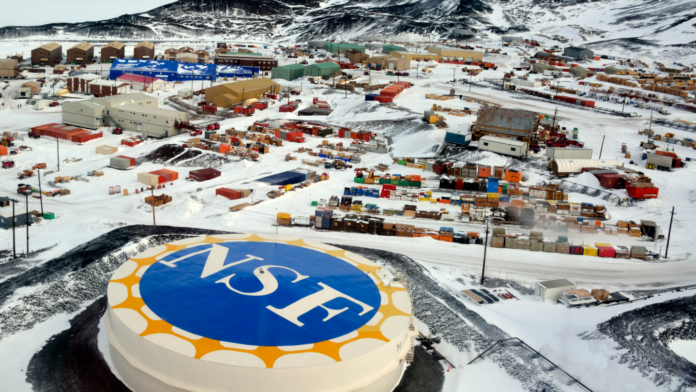“Imagine a future where artificial intelligence dictates the tempo of modern warfare, where cyber attacks can cripple entire nations, and where the boundaries between human and machine are blurrier than ever. Welcome to the world of tomorrow, where the intersection of science, defence, and security is about to take a dramatic turn.
In a recent report, NATO’s Science and Technology Organization has peered into the crystal ball, identifying the trends that will shape the future of defence and security over the next two decades. From the proliferation of autonomous weapons to the rise of quantum computing, this comprehensive report paints a fascinating yet unsettling picture of the challenges and opportunities that lie ahead.
The Rise of New Global Players: Shifting Power Dynamics
The NATO Science and Technology report highlights the emergence of new global players as a significant trend shaping the future of science, defence, and security over the next 20 years. The rise of these players is largely driven by their investments in emerging technologies, which are expected to reshape the global balance of power.
Geeksultd’s analysis suggests that emerging technologies such as artificial intelligence, quantum computing, and biotechnology will increasingly become key determinants of national power and influence. As these technologies continue to evolve, they will create new opportunities for nations to assert their dominance and challenge the existing global order.
Shifting Power Dynamics
The report notes that the rise of new global players will lead to shifting power dynamics, with some nations gaining more influence while others lose ground. This shift will be driven by the ability of nations to harness emerging technologies to enhance their military capabilities, improve their economic competitiveness, and project their influence globally.
For NATO member states, the rise of new global players presents both opportunities and challenges. On the one hand, emerging technologies offer the potential for NATO member states to enhance their defence capabilities, improve their economic competitiveness, and strengthen their global influence. On the other hand, the rise of new global players will also create new security challenges, as nations with competing interests and values seek to assert their dominance.
Practical Applications and Challenges
Integrating New Technologies into Defence Strategies
The report emphasizes the need for NATO member states to integrate emerging technologies into their defence strategies in order to remain competitive and effective. However, this integration poses significant practical challenges, including the need to overcome hurdles to adoption, balance innovation with interoperability and standardization, and address cybersecurity concerns.
Geeksultd’s analysis suggests that one of the key challenges facing NATO member states is the need to invest in infrastructure, training, and cybersecurity in order to support the adoption of emerging technologies. This will require significant investments in research and development, as well as in education and training programs.
In addition, NATO member states will need to balance the need for innovation with the need for interoperability and standardization. This will require the development of common standards and protocols for the adoption of emerging technologies, as well as the establishment of mechanisms for sharing knowledge and best practices.
The Human Factor: Ethics, Responsibility, and Governance
The Ethics of Emerging Technologies in Defence
The report highlights the need for ethical frameworks and responsible innovation in the development and deployment of emerging technologies in defence. Geeksultd’s analysis suggests that the development of emerging technologies raises significant ethical concerns, including concerns around bias, transparency, and accountability.
For example, the development of autonomous weapons systems raises concerns about the potential for bias in decision-making algorithms, as well as the need for transparency and accountability in the use of these systems. Similarly, the development of biotechnology raises concerns about the potential for misuse, as well as the need for ethical frameworks to guide research and development.
The report emphasizes the need for NATO member states to address these ethical concerns through the development of responsible innovation practices, including the establishment of ethical frameworks, the promotion of transparency and accountability, and the engagement of stakeholders in the development of emerging technologies.
Conclusion
In conclusion, the NATO Science and Technology report has shed light on the transformative trends that will shape the future of science, defence, and security over the next 20 years. The report’s findings, which span from the rise of autonomous systems to the increasing importance of space-based technologies, paint a complex and dynamic picture of the challenges and opportunities that lie ahead. From the potential of artificial intelligence to enhance military capabilities to the growing threat of cyberattacks, it is clear that the future of defence and security will be shaped by rapid technological advancements.
The significance of this report cannot be overstated. As the global security landscape continues to evolve, it is imperative that NATO and its allies stay at the forefront of technological innovation to address emerging threats and maintain a strategic edge. The implications of these trends will be far-reaching, with the potential to reshape the very nature of modern warfare and global security. As we look to the future, it is essential that we prioritize investment in research and development, foster international collaboration, and develop strategies that address the ethical and societal implications of these emerging technologies.
As we stand at the threshold of this new era, one thing is clear: the future of science, defence, and security will be shaped by human ingenuity, creativity, and perseverance. It is up to us to harness the power of technology to create a safer, more secure world for generations to come. As the report so aptly puts it, “the future is not something that happens to us, but rather something that we create.” Let us rise to the challenge and forge a future that is worthy of our highest aspirations.





